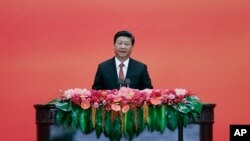Chinese President Xi Jinping will meet with titans of American business this week on their home turf. Xi kicks off a state visit to the U.S. on Tuesday in the hometown of Microsoft, Starbucks, Amazon.com and Boeing.
That presents an opportunity for those companies’ leaders to cement business ties with the world’s most populous nation. The aerospace and high-tech industries in the Pacific Northwest offer a microcosm of the tensions and rewards of doing business with China.
You need only look up in the air to appreciate the lure of the Chinese market.
Boeing executives say they're honored to be able to give the Chinese president a tour of their wide body jet factory near Seattle. In a statement, the aircraft manufacturer described sales to Chinese airlines as central to its future and to U.S. jobs. In fact, a jetliner sales announcement during this visit wouldn’t be surprising.
Another top exporter and a company that Xi will visit this week is Microsoft. The software giant has a complicated agenda.
Earlier this year, Microsoft reported slumping sales in China, driven by "geopolitical issues." That's a way of pointing out that Chinese policymakers are trying to get government and corporate users to replace imported technology with Chinese versions.
Microsoft analyst Al Hilwa of research firm IDC predicts market access will be the main issue raised by American tech companies.
"The tension here is between the Chinese government wanting to control these services and wanting them to play by its rules, and the tech companies wanting to be more unfettered and to be unleashed to compete properly with the rest of their Chinese counterparts," said Al Hilwa.
Hilwa says Microsoft and other U.S. tech companies also express frustration with software piracy in China and internet censorship.
University of Washington China expert David Bachman expects the titans of U.S. tech to be delicate in raising their concerns.
"They are going to say, 'We're telling you this as people who have long partnerships with China. We want to work with you. But the administration is going to come down heavily on you if you don't sort of begin to recognize some of the complaints here and do something about it," said Bachman.
Former U.S. ambassador to China and Washington State governor earlier, Gary Locke can list many barriers to business in China. Facebook and Twitter are blocked. So is Google oftentimes. Still, Locke believes in the potential of Xi’s visit.
"I think it's a great opportunity to emphasize our views and to indicate to China that their society would also benefit from more U.S. companies and technology companies operating on a level playing field with Chinese companies," said Locke.
Locke says the fortunes of Pacific Northwest exporters, in some ways, mirror the strengths and weaknesses of the overall U.S.-China relationship.




